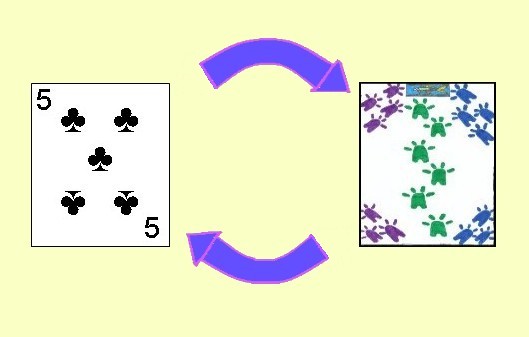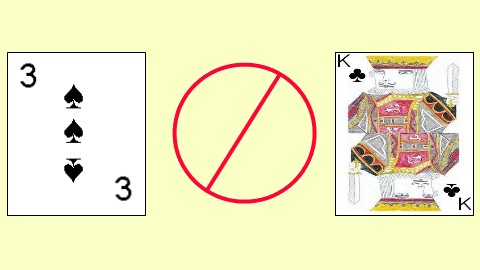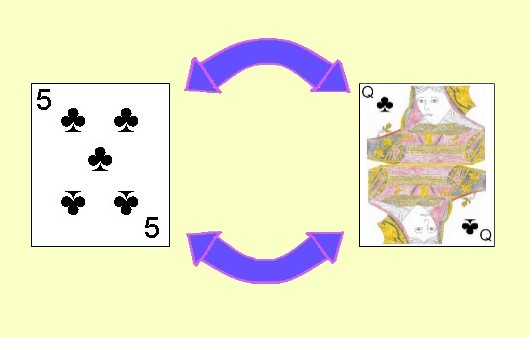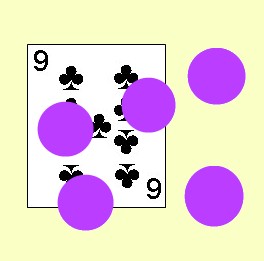
|
|
In Cuckoo when requested to swap by his left hand neighbor a player generally must oblige.
|
Cuckoo is an exciting and hilarious game for card players of all ages. This game is often called Ranter Go Round, Slap Your Neighbor or Chase the Ace in recognition of the manner in which players will "chase" the Ace around the table. It is also sometimes called even more colorful names.
Cuckoo can be played by virtually any number of players, even up to 25 or more. It is great fun for large crowds, and is best when played by at least five. Cuckoo is played with one standard deck of 52 cards. For especially large crowds two decks with the same or differing back designs can be shuffled together. The ranking of the cards from high to low is as follows: King, Queen, Jack, 10, 9, 8, 7, 6, 5, 4, 3, 2, Ace. The suits of the cards are irrelevant in this game and have no bearing in the play of each hand.
Before a game of cuckoo begins, each player should be provided three tokens which they keep on the table in front of themselves.
The first dealer can be determined in any manner, usually by having all participants cut for high card with the player receiving this high card having the right to be the first dealer. In the case of a tie for high card, these players would draw again for high card, continuing in this way until one, singular player draws the highest card.
Once determined, this first dealer begins by dealing one card face down to each player, starting with player to his immediate left and continuing clockwise around the table, ending by dealing himself his own card. The remainder of the pack of cards is set face down somewhere in front of the dealer. The players may then look at their own individual card.
The object of each hand is to not be the player left holding the lowest card of the hand. Each player is allowed one turn, starting with the player to the dealer's immediate left.
During this turn the player then decides if he wants to keep his own card or exchange it with the player to his immediate left. He indicates this by stating Stand (to keep his card) or Change (to exchange it). This left hand player must exchange their card with you when asked and the cards should be exchanged face down so no other players can see the cards values. However, if the left hand player has a King, in which they must expose the King and both players keep their original card.
Each player gets a similar turn up to the dealer who may, if he chooses exchange his card with the top card of the remaining, undealt stock. If this card is a King, he may not take the King and must keep his current card.

|
|
However, a player holding a King shows the card and is not required to swap.
|
After each player has had their turn, ending with the dealers turn of play, everyone turns their card face up on the table in front of themselves. Whoever has the lowest card on the table loses one of their tokens which they place in a special pile in the center of the table. If two or more players are tied for the lowest card, they all lose one token to the center pile. After this, all the cards are gathered together, shuffled and cut. The player to the immediate left of the last dealer then becomes the new dealer and deals out a new hand.
When a player has lost his last token to the pile in the center he must drop out of the game.
The winner is the last player remaining in the game who still has at least one token when all others have lost all three of theirs.
If the last players remaining in the game (each with just one token each) all tie for lowest card in the hand, they each keep their token for the hand and deal another hand using the same rules. If the players tie again this can continue until all but one player has lost all their tokens.

There are a wide variety of variations of this game that are played throughout the world, including those given below. Multiple variations are often combined to create almost limitless gameplay combinations.
Multiple Tokens: This version is played exactly like the standard version described above. However each player is provided with four tokens instead of the three normally provided. This makes for a slightly longer game or is sometimes also used when their might be fewer players.
Alternate Exchange: This version is also played similarly to the original game, with one major exception. If a player is asked to exchange his card, by the previous player, the player who was asked to exchange, after making the exchange (unless it is a King) loses their own turn and does not get the opportunity to ask player to their left to exchange. Thus the turn skips to the next player AFTER the player who was asked to exchange their card. If the dealer was not asked to exchange they can, as in the parent game, still exchange with the stock. The rest of the rules for this variation are identical to the standard game described above.
King Variation 1: In this variation, a King does not entitle a player to retain it and he must still trade that card. In the same way, if the dealer draws a King from the deck he may still make the exchange with that King.
King Variation 2: As soon as the first King is flipped over, by someone attempting to trade with a player having one, that trade does not occur and all other trades for that hand are prematurely stopped. All players then immediately flip over their cards and, as in the parent game, the player or players holding the lowest card lose one of their tokens to the center pile.
Queen Rule: If someone attempts to trade a card with you, and you have a Queen, that player must instead trade with the player to their immediate right. If that player also holds a Queen, then you make no trade with any player and the turn passes to the next player to the current player's right. If the dealer trades, and the card drawn from the stock pile is a Queen, he may not take this card and must instead trade his card with that of the player to his right (unless that player holds a Queen, in which he makes no trade). As in all other described versions of this game, lowest card at the end of the hand loses a token to the center pile.
Aces High: This version is played identically to the standard version, however in this version Aces are considered the highest card, and King the second highest, while the lowest card is the deuce (two). Beware, though, as holding an Ace does not make you immune to being forced to swap cards when requested.
Jack Rule: In this version, holding a King provides a player with no special immunity from swapping with another player as the game rules allow. Instead, when a player holds a Jack and asked to trade, they may display the Jack and are not forced to trade the card.
 Onesies
Onesies: In this variation each player is provided 5 tokens or chips before starting the game. When a player is asked to trade, he may, instead, at his discretion pay a penalty of one token to a pile in the center of the table and is not forced to make the trade nor show his card. The standard rule for Kings still applies, and if that player has a King and chooses to expose it, he does not have to make the trade or lose a token. The player who asked for the trade must then keep his card and the turn moves to the player who was asked to trade. At the end of the hand, the players with the lowest hand must pay two tokens to the center. If there is a tie for the lowest hand, the number of tokens lost for each of these players is equivalent to the number of individuals tied for the lowest card. A player with only one chip may not refuse a trade and lose his last chip. Once a player loses all his chips, he must drop from the game. The last player with one or more chips remaining is declared the winner of the game.
Full Rotation: This version is also played identically to the standard version with one exception. Instead of the dealer swapping his card with the top card of the stock pile, if he is able and chooses to swap, will swap with the player to his immediate left. Thus he will, if he chooses to make a card exchange, swap card with the player who had the very first opportunity to swap cards in the hand. As in the normal version, however, if the dealer has already been forced to swap by the player at his right, cannot request such an exchange. Also as in other versions, once the dealer has had their turn, the hand ends and all players expose their cards with the highest card displayed winning the hand.
Copyright © 2015
CatsAtCards.com. All rights reserved.


 There are a wide variety of variations of this game that are played throughout the world, including those given below. Multiple variations are often combined to create almost limitless gameplay combinations.
There are a wide variety of variations of this game that are played throughout the world, including those given below. Multiple variations are often combined to create almost limitless gameplay combinations.